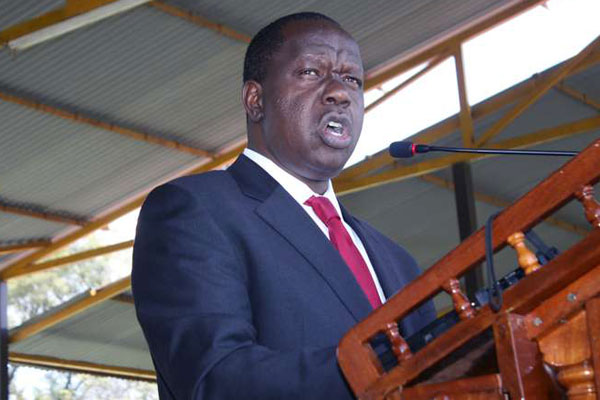Africa/Ugnda/Kampala/By Moses Kyeyune
Resumen: El Presupuesto 2017/2018 se proyecta registrar una drástica disminución de los fondos para los sectores de la agricultura, la educación y la salud, mientras que se espera que las asignaciones a la tierra, la energía y las TIC formen gran parte de las asignaciones presupuestarias. De acuerdo con información confidencial obtenida por el Daily Monitor, el presupuesto que se proyecta verá la caída del presupuesto agrícola de Shs823.4b a Shs784b mientras que la financiación a la educación caerá de Shs115.5b a Shs2.33 billones y la salud se reducirá de Shs1.29 billones a Shs534.8b.
Kampala — The 2017/2018 Budget is projected to register drastic decline in funding for the agriculture, education and health sectors while allocations to land, energy and ICT are expected to take a lion’s share.
According to a confidential Cabinet brief obtained by Daily Monitor, the Budget which is projected to shoot up to Shs28.8 trillion, will see agriculture budget fall from Shs823.4b to Shs784b while funding to education will fall by Shs115.5b to Shs2.33 trillion and health will drop from Shs1.29 trillion to Shs534.8b.
But the budget for energy and mineral development is projected to rise by Shs626.3b from Shs2.34 trillion while security will rise from Shs1.57 trillion to Shs1.95 trillion.
Information and Communications Technology will benefit from a Shs17.2b increase, according to the document.
Mr Jim Mugunga, the ministry of Finance public relations officer, declined to discuss the projections, saying it was premature.
«Information and or justifications of sector level funds allocations will be given by the ministry in the formal interface with Parliament which is due soon,» he said.
«Basic drivers for budgeting include government priority areas, mainstreaming high impact of hitherto less funded sectors (and that) decisions are shaped by executive commitments, National Development Plan and the manifesto, among others,» Mr Mugunga said.
The Budget, according to the Cabinet brief, will be financed through preliminary available resources standing at Shs14. 4 trillion while the rest of the money will be raised through foreign and domestic borrowing. The Public Finance Management Act, 2015, requires government to present to Parliament budget projections for the new financial year (Budget Framework Paper) before end of December.
Mr Matia Kasaija, the Finance minister told Daily Monitor all was set and that the ball remains for the Speaker to roll. «I am ready to present to Parliament as required by law. The rest, just ask the Speaker,» Mr Kasaija said.
Although Mr Kasaija declined to discuss details of the projections, Mr Mugunga told Daily Monitor that the December 31 deadline will be met.
«We have briefed Cabinet as required and secured approval to submit to Parliament. We shall ensure adherence to the law and meet the timelines,» Mr Mugunga said.
But by press time, both the Information Office at Parliament and the Directorate of Communications and Public Affairs had not confirmed whether Parliament would be receiving the Budget Framework Paper today before breaking off for Christmas.
Mr Musasizi, who is the chairperson of Parliament’s Committee on Finance, said priority was given to agriculture for «obvious reasons.»
«We have to promote food production through irrigation and other counter-measures against drought,» he said.
Ms Cissy Kagaba, the Anti-Corruption Coalition Uganda executive director, said the Budget projections neglect basic priority sectors which would benefit the ordinary citizen and thus is likely to demoralise public participation in aiding government programmes. «You cannot achieve a middle income economy without substantial investment in education and health,’ she said.
Ms Kagaba also said «agriculture as the backbone of Uganda and a source of income for most rural poor should be invested in highly.»
Information privy to Daily Monitor also indicates that Shs915.8b has been earmarked for external debt repayment while Shs110b is to be directed towards clearing domestic debt.
Uganda is currently nursing a public debt of $7.6b estimated at 34.4 per cent of its Gross Domestic Product with foreign debts standing at Shs17 trillion and domestic debts at Shs11.6 trillion, both Shs28.6 trillion; only Shs200b below the projected Budget.
Mr Julius Kapwepwe, the Uganda Debt Network director of programmes, welcomed the Budget projections for the security sector, saying the «funding increase is due to a military hospital and packages for retiring soldiers.»
But he said government needed to study its choices for loans, most of which lie idle while several other funds remain unaccounted for.
«There are idle funds in those sectors, plus accountability concerns, taking the case of UNRA, health and education. With no new projects, UNRA has continued to receive full funding,» he said, adding: «Until those flagship sectors fully account, funding should reduce.»
Fuente: http://allafrica.com/stories/201612230224.html
Imagen tomada de: https://i.ytimg.com/vi/wEdpGqWdlVc/0.jpg













 Users Today : 25
Users Today : 25 Total Users : 35460156
Total Users : 35460156 Views Today : 39
Views Today : 39 Total views : 3418822
Total views : 3418822